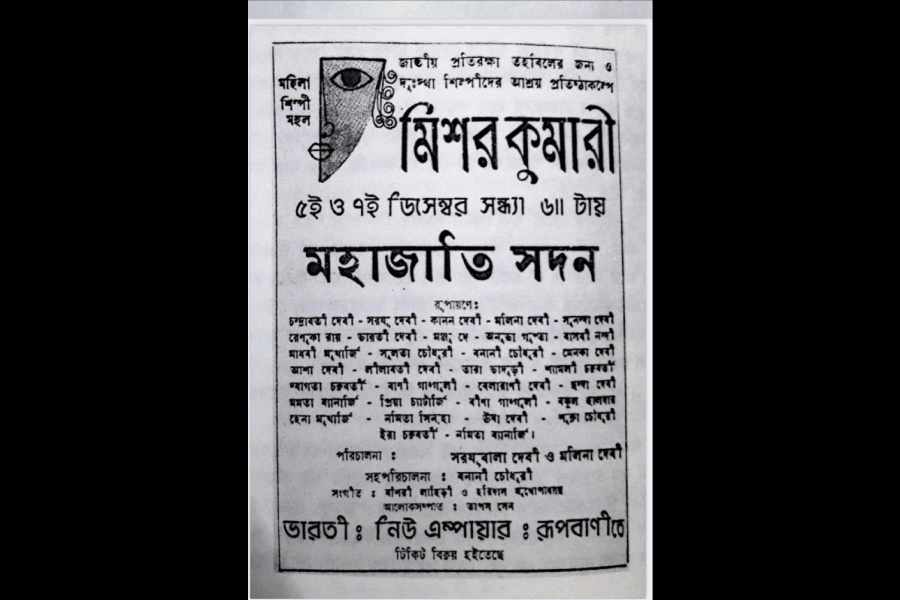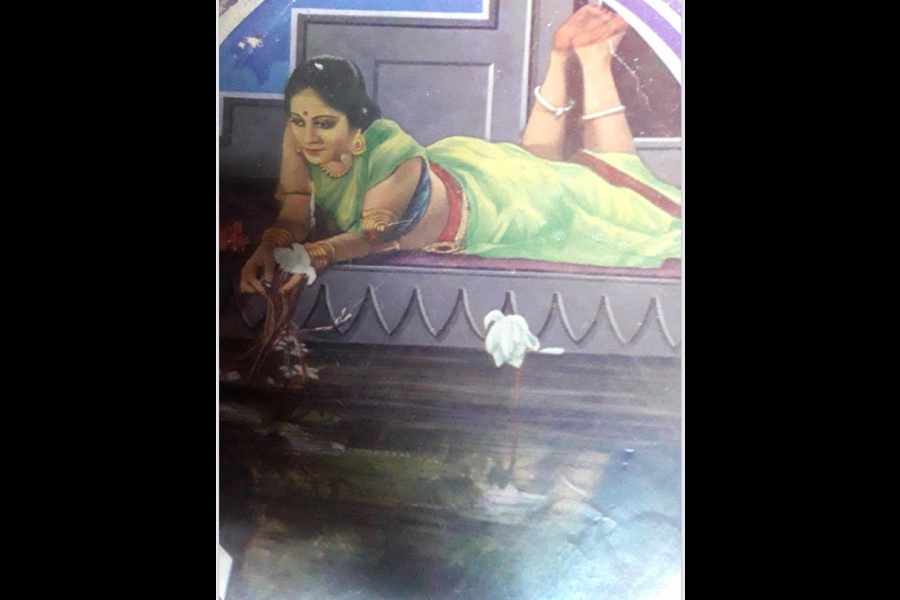Kanan Devi is remembered as one of the most dazzling stars of early Indian cinema. Her other work has almost been forgotten. It included, even if for a brief moment, a women’s theatre.
The singing actor, who charmed audiences with her beauty, voice and acting, appearing at a time Indian cinema was transitioning from the silent era to the “talkies”, was a pioneer in the film industry in many ways.
A glimpse of her onscreen and off-screen accomplishments came on December 12 evening at the Academy Theatre’s programme, Kanan Theke Keya, in Calcutta. It looked, with the help of theatre songs, at the lives of exceptional stage and film actresses in Bengal from the early days to recent times.
Kanan Devi was the starting point for the programme, and not without reason, though some other featured actresses preceded her chronologically.
Among other things, she had started her own film production company in 1949 when the industry was ruled by men. But perhaps no less outstanding was Mahila Shilpi Mahal, an organisation she had started with other actresses to help senior actresses who had been reduced to destitution. Poverty and an undignified death, after a life of sexual exploitation, were the fate of many actresses, including a few leading names.

Poster of Mishar Kumari, stayed by the Mahila Shilpi Mahal
The organisation, active through the ’60s and ’70s, helped several actresses. It raised money primarily through the performance of plays. What also happened in the process, if only temporarily, was a theatre of women.
In her 1973 autobiography, Shobare Ami Nomi (I Salute Everyone), Kanan Devi, who gave New Theatres studio in Calcutta some of its major hits, and was sometimes referred to as “the first superstar of Bengali cinema”, recalls how Mahila Shilpi Mahal was formed. Her account and those of other actress-members are the sources of information about the organisation.
One day, as she was about to leave a studio, a woman, her head covered with the sari-end, approached her and stretched out her hand for some money. Kanan Devi, at the top of her fame then, having played lead roles in Manmayee Girls’ School, Mukti and Shesh Uttar, was told the woman begging for money was once a famous actress herself.
This stayed in Kanan Devi’s mind.
She discussed the condition of older actresses with other eminent actresses, including Malina Devi, Saraju Devi, Sunanda Devi, Chandrabati Devi and Renuka Roy.
Actress Bharati Devi remembers how, at her Rashbehari Avenue residence where Kanan Devi and most of these actresses were present, an adda changed into a discussion about forming Mahila Shilpi Mahal, with Kanan Devi at the helm.
The group just plunged into staging plays to raise money. They rehearsed wherever they could. “One day it would be at my place, another day at Chandra’s place, the next day at Malina’s place,” Kanan Devi writes.
The results were spectacular. Actress Madhabi Mukherjee, who was very young then, acted in several plays performed by the group. The performances ran to full houses.
Mishar Kumari was the first play to be performed. A poster of the play, to be performed at Mahajati Sadan, has the entire cast mentioned on it: 32 actors, all women.
The directors are Sarajubala Devi and Malina Devi. Bonani Chowdhury is the assistant director and Bansari Lahiri — with Haridas Mukhopadhyay, the first man to find a mention — are the music directors. The only other man named in the production is the stalwart Tapas Sen, who did the lights.
Malina Devi, cast as the male character Abon, made famous earlier by the celebrated actor Ahindra Chowdhury, was the star of the show.
Kanan Devi does not mention the other plays. Her voice is restrained in her autobiography. Women often tend to not think much of their work. But she says what happened next.
“The money raised from the first performance went beyond all expectation,” Kanan Devi writes.
The funds raised in a few years allowed the group to buy a house in Gorcha Road where actresses who needed support could stay. It was a dream come true. The actresses were also supported with money.
“(Classical musicians) Sunanda Pattanayak, Mohammad Sagiruddin and Ustad Keramatullah Khan performed at a concert to raise money for us,” Kanan Devi adds.
Singer Pattanayak, sitar maestro Ravi Shankar and actress Suchitra Sen donated money on behalf of artists’ groups.
But after a few years, a difference of opinion arose within the organisation. Kanan Devi would be accused of forming the organisation as a power trip. In dismay, she decided to dissolve Mahila Shilpi Mahal.
Its untimely death is worth thinking about. The Academy Theatre presentation by the Devajit and Riddhi Bandyopadhyay Academy, also about actresses before and after Kanan Devi, pointed at how much things have changed, or not, for women.











